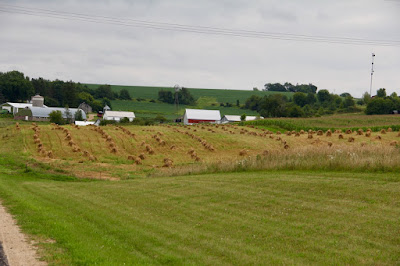 |
| family farm in the Driftless Area
Photo by J. Harrington
|
But the justifications of the family farm are not merely agricultural; they are political and cultural as well. The question of the survival of the family farm and the farm family is one version of the question of who will own the country, which is, ultimately, the question of who will own the people. Shall the useable property of our country be democratically divided, or not? Shall the power of property be a democratic power, or not? If many people do not own the useable property, then they must submit to the few who do own it. They cannot eat or be sheltered or clothed except in submission. They will find them selves entirely dependent on money; they will find costs always higher, and money always harder to get. ...If we continue on the course of agricultural consolidation, with fewer, but bigger, concentrated animal feeding operations [CAFO], won't we end up with the equivalent of the feudalism of old? (Broadly defined, it was a way of structuring society around relationships derived from the holding of land in exchange for service or labour.) Since each state is represented by two United States Senators, regardless of population, fewer people in rural areas give each remaining rural resident a disproportionate influence on national policy. We've seen unfortunate examples of what that can lead to during the past decade or so, haven't we?
 |
| how much field corn do we really need?
Photo by J. Harrington
|
It seems to me that proportional representation (of people, not corporate persons) is one of the biggest reasons we can't allow the Democratic Party to abandon rural America to the Republicans. It may well be that my New England background is biasing me. I've a clear picture of New England farmers and townfolks who recognized their dependence on each other, that they were "all in this together." New England town squares were often centered upon a commons, one that was often much better managed than Garrett Hardin would have us believe is feasible. Once I believed that to be true. Then I started to read about Elinor Ostrum's approach to Governing the Commons. Ostrum has identified 8 principle for managing the commons. Read them and see if you disagree with any. Then think about how this country, and its major political parties, are being managed.
8 Principles for Managing a Commons
1. Define clear group boundaries.
2. Match rules governing use of common goods to local needs and conditions.
3. Ensure that those affected by the rules can participate in modifying the rules.
4. Make sure the rule-making rights of community members are respected by outside authorities.
5. Develop a system, carried out by community members, for monitoring members’ behavior.
6. Use graduated sanctions for rule violators.
7. Provide accessible, low-cost means for dispute resolution.
8. Build responsibility for governing the common resource in nested tiers from the lowest level up to the entire interconnected system.
The Need of Being Versed in Country Things
By Robert Frost
Not to believe the phoebes wept.The house had gone to bring againTo the midnight sky a sunset glow.Now the chimney was all of the house that stood,Like a pistil after the petals go.
The barn opposed across the way,That would have joined the house in flameHad it been the will of the wind, was leftTo bear forsaken the place’s name.
No more it opened with all one endFor teams that came by the stony roadTo drum on the floor with scurrying hoofsAnd brush the mow with the summer load.
The birds that came to it through the airAt broken windows flew out and in,Their murmur more like the sigh we sighFrom too much dwelling on what has been.
Yet for them the lilac renewed its leaf,And the aged elm, though touched with fire;And the dry pump flung up an awkward arm;And the fence post carried a strand of wire.For them there was really nothing sad.But though they rejoiced in the nest they kept,One had to be versed in country things
********************************************
Thanks for visiting. Come again when you can.
Please be kind to each other while you can.
No comments:
Post a Comment